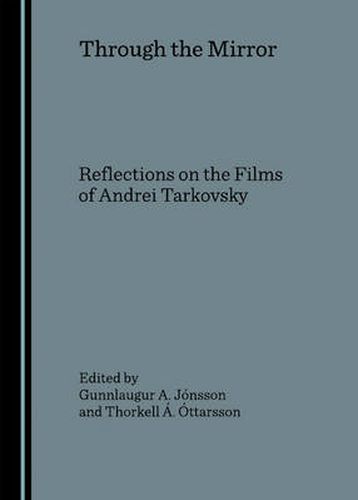Readings Newsletter
Become a Readings Member to make your shopping experience even easier.
Sign in or sign up for free!
You’re not far away from qualifying for FREE standard shipping within Australia
You’ve qualified for FREE standard shipping within Australia
The cart is loading…






The authors of this book are from various countries and have diverse educational backgrounds but they are united by one common thing; their love of Andrei Tarkovsky’s films. Tarkovsky is one of the greatest film directors of all time and the most famous Soviet film maker since Eisenstein. He died of lung cancer in Paris 28th December 1986, only 54 years of age. This year, 2006, therefore marks the 20th anniversary of his passing.This is most likely the broadest volume on Tarkovsky, spanning everything from classical film theories to theological analyses, via sociology and the history of the ANS synthesizer. It is divided into two parts. The first part is called Film theories and, as the name suggests, contains papers that touch more or less on film theories.Benjamin Halligan and Terence McSweeney write about Tarkovsky’s aesthetic strategies and film theory. Sean Martin writes about the autobiography in Tarkovsky’s films, David Beer about the music in Solaris, Oddny Sen analyzes dream-symbolism in the films with an emphasis on Ivan’s Childhood and Paul Johnson looks at Tarkovsky’s films from a sociological perspective.The second part of the book concentrates on theological themes in Tarkovsky’s films. This kind of approach has been seriously neglected by most books and papers written about his films until now. Two of the papers in this part are general in nature. Torsten Kalvemark writes about the philosophical and theological understanding of Andrei Tarkovsky’s work and Astrid Soederbergh Widding analyzes what’s between the visible and invisible in the films of Tarkovsky. The remaining five papers concentrate on specific films, namely, Ivan’s Childhood, Andrei Rublev, Stalker, Nostalgia and The Sacrifice.Tarkovsky frequently invited the audience to interpret his films as they saw fit. The authors of the papers in this book have all accepted Tarkovsky’s invitation.The academic discussion of film and religion has recently entered a new and increasingly vital phase. One of the epicenters of this international discussion is the Icelandic group Deus ex Cinema. This is their first publication accessible to non-Icelandic readers … and it delivers everything that is promised. It takes you all the way from Tarkovsky’s childhood through Gilles Deleuze and Pavel Florensky to God - and back again. Through the Mirror is an inspiring collection of critical essays…Ola Sigurdson,Associate Professor in Systematic Theology Goeteborg University, SwedenAs the editors rightly state, little analysis has been leveled at the rich religious motifs and quotations within Tarkovsky’s films… This compilation is therefore welcome for its focus as well as its approach; avoiding the extremes of pat reductionism or whimsical analysis, the various authors here strike a compelling pose between cinematic and theological scholarship and a respect for ambiguity and multiple interpretations. The writing is serious yet accessible…Doug Cummings, Nostalghia.com
$9.00 standard shipping within Australia
FREE standard shipping within Australia for orders over $100.00
Express & International shipping calculated at checkout
The authors of this book are from various countries and have diverse educational backgrounds but they are united by one common thing; their love of Andrei Tarkovsky’s films. Tarkovsky is one of the greatest film directors of all time and the most famous Soviet film maker since Eisenstein. He died of lung cancer in Paris 28th December 1986, only 54 years of age. This year, 2006, therefore marks the 20th anniversary of his passing.This is most likely the broadest volume on Tarkovsky, spanning everything from classical film theories to theological analyses, via sociology and the history of the ANS synthesizer. It is divided into two parts. The first part is called Film theories and, as the name suggests, contains papers that touch more or less on film theories.Benjamin Halligan and Terence McSweeney write about Tarkovsky’s aesthetic strategies and film theory. Sean Martin writes about the autobiography in Tarkovsky’s films, David Beer about the music in Solaris, Oddny Sen analyzes dream-symbolism in the films with an emphasis on Ivan’s Childhood and Paul Johnson looks at Tarkovsky’s films from a sociological perspective.The second part of the book concentrates on theological themes in Tarkovsky’s films. This kind of approach has been seriously neglected by most books and papers written about his films until now. Two of the papers in this part are general in nature. Torsten Kalvemark writes about the philosophical and theological understanding of Andrei Tarkovsky’s work and Astrid Soederbergh Widding analyzes what’s between the visible and invisible in the films of Tarkovsky. The remaining five papers concentrate on specific films, namely, Ivan’s Childhood, Andrei Rublev, Stalker, Nostalgia and The Sacrifice.Tarkovsky frequently invited the audience to interpret his films as they saw fit. The authors of the papers in this book have all accepted Tarkovsky’s invitation.The academic discussion of film and religion has recently entered a new and increasingly vital phase. One of the epicenters of this international discussion is the Icelandic group Deus ex Cinema. This is their first publication accessible to non-Icelandic readers … and it delivers everything that is promised. It takes you all the way from Tarkovsky’s childhood through Gilles Deleuze and Pavel Florensky to God - and back again. Through the Mirror is an inspiring collection of critical essays…Ola Sigurdson,Associate Professor in Systematic Theology Goeteborg University, SwedenAs the editors rightly state, little analysis has been leveled at the rich religious motifs and quotations within Tarkovsky’s films… This compilation is therefore welcome for its focus as well as its approach; avoiding the extremes of pat reductionism or whimsical analysis, the various authors here strike a compelling pose between cinematic and theological scholarship and a respect for ambiguity and multiple interpretations. The writing is serious yet accessible…Doug Cummings, Nostalghia.com